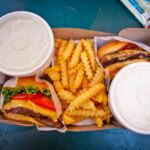Energy drinks are everywhere, especially when you have teenagers in the house.
They’ve become a go-to solution for staying alert and energized, from late-night study sessions to pre-game routines.
But it’s important to remember that not all energy drinks are created equal!
When it comes to caffeine content, some pack a huge punch, which might be a blessing for a gamer midway through a marathon or a curse for your heart rate.
Keep reading if you’re wondering which drinks deliver the most caffeine and whether they’re right for you.
This blog spotlights the top contenders, their caffeine counts, and what you should consider before opening one.
Why Pay Attention to Caffeine Levels?
Caffeine can boost focus, improve endurance, and provide a quick energy surge.
However, too much caffeine can cause side effects like jitters, rapid heart rate, and even serious health risks if consumed in excess.
Experts recommend that most adults limit their caffeine intake to 400 milligrams (mg) per day (“Caffeine: How Much Is Too Much?,” 2025). But many energy drinks can have almost this amount in a single serving!
Today’s post is especially for athletes, students, and gamers. Protect your health by knowing what you’re consuming.
The 5 Energy Drinks with the Highest Caffeine Content
1. Bang Energy

- Caffeine Content: 300 mg per can (16 oz)
Bang Energy is one of the heavyweights in the caffeinated drink category.
Popular among gym enthusiasts, athletes, and late-night grinds, it’s loaded with caffeine, amino acids, and even super creatine.
While it promises “sustained energy,” be careful—300 mg is high and not ideal for beginners or anyone sensitive to caffeine.
Key Note:
Watch out! The caffeine here equals about three cups of coffee in just one can. Sip wisely.
Click here to purchase Bang Energy drinks.
2. Reign Total Body Fuel

- Caffeine Content: 300 mg per can (16 oz)
Marketed as a performance drink for athletes, Reign Total Body Fuel packs the same caffeine punch as Bang Energy.
Beyond that, it includes electrolytes and BCAAs (branched-chain amino acids) to support muscle recovery.
It’s a favorite pre-workout drink, but should you drink this daily? Probably not.
Key Note:
Hydration might be part of the promise, but with this much caffeine, overdoing it could do more harm than good. Again, moderation is key.
Click here to purchase Reign Total Body Fuel on Amazon
3. Celsius Heat

- Caffeine Content: 300 mg per can (16 oz)
Celsius Heat raises the energy bar for gym lovers. It’s marketed as a fat-burning drink that claims to boost metabolism alongside its immediate energy boost.
With no artificial flavors or preservatives, it’s one to consider when prioritizing ingredients.
Caution remains, however—300 mg of caffeine makes this drink no joke.
Key Note:
You might feel ready to crush your workout, but be wary of possible crashes hours after sipping.
Click here to purchase Celsius Heat
4. 5-Hour Energy Extra Strength

- Caffeine Content: 230 mg per shot (2 oz)
One of the most concentrated forms of energy on this list, 5-Hour Energy delivers 230 mg of caffeine in just two ounces!
Its small size makes it easy to carry, and it’s a favorite among students cramming for exams or professionals needing a midday boost.
But don’t underestimate its strength—it’s concentrated for immediate energy, which can cause jitters if you’re not used to it.
Key Note:
Sure, it works fast. But its intensity and tiny size can make it easy to overconsume—limit yourself to just one!
Click here to purchase 5-Hour Energy
5. Monster Energy (Mega Monster)

- Caffeine Content: 240 mg per can (24 oz)
Monster has been a staple in energy drink culture for years, and its Mega Monster packs an oversized caffeine dose.
Its bold flavors and long-lasting energy make it popular among gamers and students.
However, its sugar content—54 grams in a Mega Monster—makes it less ideal for health-conscious drinkers.
Key Note:
If you’re looking for extended energy but want to avoid excess sugar, Monster offers zero-sugar options.
Purchase Mega Monster on Amazon
Is All That Caffeine Too Much?
Now that you know which energy drinks are packing the most caffeine, the next question is whether they’re the right choice for you.
Overconsumption of caffeine can lead to:
- Increased heart rate
- Insomnia
- Anxiety or irritability
- Headaches
Tips for Safe Energy Drink Consumption:
- Know Your Limit: Adults should ideally consume no more than 400 mg of caffeine daily. For teens, the limit is typically 100 mg/day.
- Start Small: If you’re new to high-caffeine drinks, use smaller amounts to gauge your tolerance.
- Avoid Pairing with Alcohol: Mixing energy drinks and alcohol is a bad idea—it can mask intoxication and increase heart risks.
- Stay Hydrated: Caffeine is a diuretic; pair it with plenty of water.
- Read the Labels: Ingredients matter! Added sugars and artificial chemicals could greatly affect how your body reacts.
Moderation is your best friend. While an occasional energy boost is fine, daily reliance on high-caffeine drinks isn’t sustainable or healthy.
Healthier Alternatives to High-Caffeine Energy Drinks
If you’re looking to stay alert but want to reduce your reliance on caffeine-heavy drinks, consider these alternatives:
- Green Tea (30–50 mg caffeine per cup): Provides a gentle energy boost with antioxidants.
- Cold-brew coffee (150–200 mg caffeine per serving) is a smoother alternative to energy drinks with no added sugars.
- Electrolyte Drinks with Vitamins (caffeine-free): Perfect for athletes looking to rehydrate post-workout.
- Smoothies or Protein Shakes: Packed with natural energy from fruits and nutrients for post-workout recovery.
Small swaps in your daily routine can enhance focus and reduce the crash associated with highly caffeinated drinks.
Energize Responsibly!
Energy drinks, especially those on this list, can be a game-changer for students, athletes, and gamers seeking that extra push.
But with caffeine, it is best to know our limits, stay informed, and not underestimate moderation’s power.
And remember—a quick energy boost won’t replace good habits.
We should prioritize sleep, hydration, and a balanced diet to stay sharp and energized long-term.




